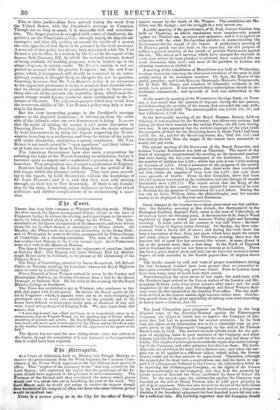Two or three packet-ships have arrived during the week from
the United States, with the President's message to Congress. Though not so long as usual, it is unusually dull and uninstruc- tive. The larger portion is occupied with a sort of vindicatory dis- quisition on the President's policy ; strongly urging its singular ad- vantages ; and thus slily putting on record the merits of a system the very opposite of that likely to be pursued by his rival successor. A reversal of that policy has already been attempted, while Mr. VAN BUREN is yet in office, in a motion by Mr. CLAY for the repeal of the famous Sub-Treasury Bill, by which the national revenue, instead Of being available for banking purposes, is to be locked up, in the shape of specie, in certain vaults. Mr. CLAY'S motion is, not ex- pected to succeed with the present Congress ; but the new Con- gress, which, it is supposed, will shortly be convened in an extra- ordinary session, is thought likely to abrogate the law in question. Granting, however, that Mr. VAN Boris's policy is as erroneous as his opponents pronounce it to be, it seems at least doubtful whe- ther its abrupt reversal can be productive of good : to leave every- " thing else out of the account, the instability alone, which such fre- quent change would denote, would be most detrimental to the in- terests of the state. The evil consequences which may result from the inveterate dislike of Mr. VAN BUREN'S policy may help a reac- tion in his favour.
But the most interesting passage in the President's message relates to the disputed boundaries : it informs us, from the other side of the Atlantic, what our own Government is doing. It seems that the mode of settling the matter is still under discussion in Downing Street. The President, judging from the desire evinced by both Governments to bring the dispute respecting the North- eastern boundary to a settlement, and from the nature of the points still under discussion, anticipates a speedy conclusion. Mr. VAN Btrants is not much versed in " open questions," and their value— :or at least not so well as those in Downing Street.
The American Government have also made a proposition for referring the Lake of the Woods boundary to arbitration, before it becomes quite so urgent and complicated a question as the Maine boundary. That proposition also is under consideration in England.
Rumours had reached the United States of the arrival of Bri- tish troops within the disputed territory. They were sent, accord- ing to the report, by Lord SYDENHAM, without the knoqledge of Sir Joins Ishavur ; and it is said that they were only passing through, on their way to New Brunswick. If there is any founda- tion for the story, it certainly seems indiscreet to have thus risked collisions and further complications of so embarrassing a ques- tion.


























 Previous page
Previous page